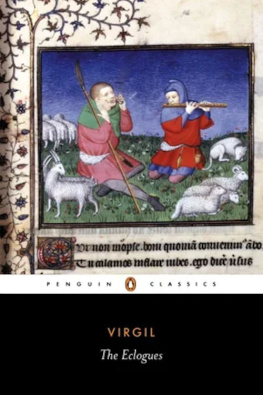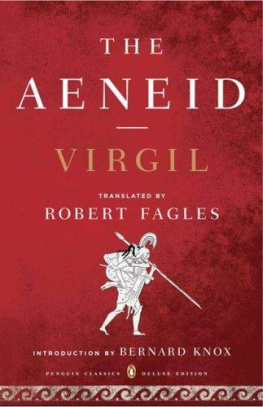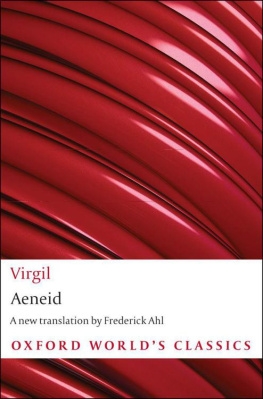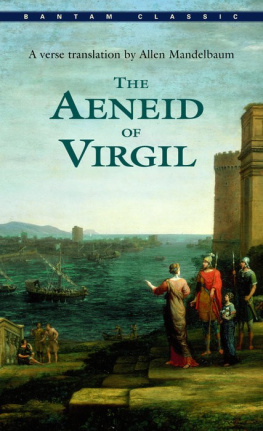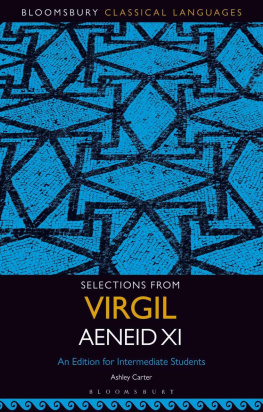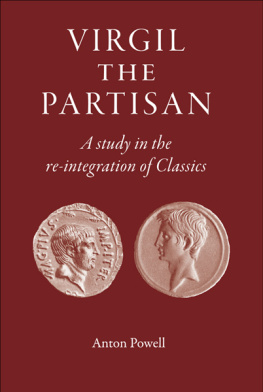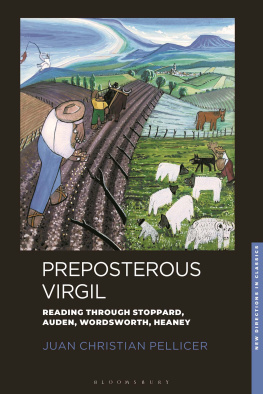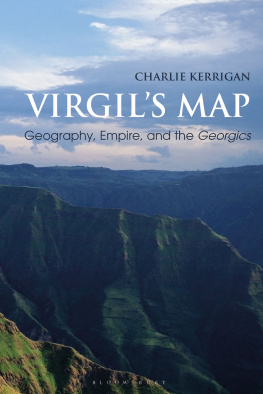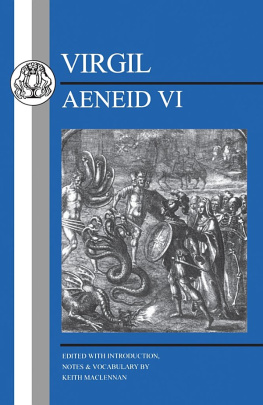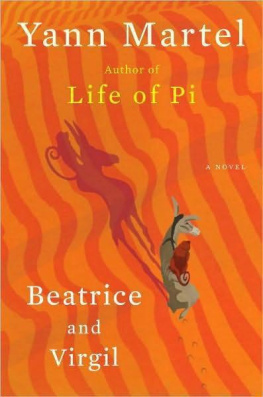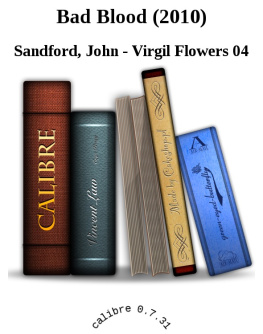Virgil - The Eclogues
Here you can read online Virgil - The Eclogues full text of the book (entire story) in english for free. Download pdf and epub, get meaning, cover and reviews about this ebook. year: 2006, publisher: Penguin UK, genre: Detective and thriller. Description of the work, (preface) as well as reviews are available. Best literature library LitArk.com created for fans of good reading and offers a wide selection of genres:
Romance novel
Science fiction
Adventure
Detective
Science
History
Home and family
Prose
Art
Politics
Computer
Non-fiction
Religion
Business
Children
Humor
Choose a favorite category and find really read worthwhile books. Enjoy immersion in the world of imagination, feel the emotions of the characters or learn something new for yourself, make an fascinating discovery.
- Book:The Eclogues
- Author:
- Publisher:Penguin UK
- Genre:
- Year:2006
- Rating:4 / 5
- Favourites:Add to favourites
- Your mark:
- 80
- 1
- 2
- 3
- 4
- 5
The Eclogues: summary, description and annotation
We offer to read an annotation, description, summary or preface (depends on what the author of the book "The Eclogues" wrote himself). If you haven't found the necessary information about the book — write in the comments, we will try to find it.
The Eclogues — read online for free the complete book (whole text) full work
Below is the text of the book, divided by pages. System saving the place of the last page read, allows you to conveniently read the book "The Eclogues" online for free, without having to search again every time where you left off. Put a bookmark, and you can go to the page where you finished reading at any time.
Font size:
Interval:
Bookmark:

THE ECLOGUES
ADVISORY EDITOR: BETTY RADICE
PUBLIUS VERGILIUS MARO was born in 70 BC near Mantua in Cisalpine Gaul, the north of Italy, where his parents owned a farm. He had a good education and went to perfect it in Rome. There he came under the influence of Epicureanism and later joined an Epicurean colony on the Gulf of Naples where he was based for the rest of his life. In 42 BC he began to write the Eclogues, which he completed in 37 BC , the year in which he accompanied Horace to Brindisi. The Georgics were finished in 29 BC , and he devoted the rest of his life to the composition of the Aeneid. In his last year he started on a journey to Greece; he fell ill at Megara and returned to Italy, but he died in 19 BC on reaching Brindisi.
ARTHUR GUY LEE was born in 1918 and educated at the Glebe House, Hunstanton, Loretto School, Musselburgh and St Johns College, Cambridge, where he was admitted as a Fellow in 1946. He has served the College successively as Tutor, Praelector and Librarian, and the University as Lecturer in Classics. His publications include commentaries on Ovids Metamorphoses I and Ciceros Stoic Paradoxes, poems in Latin and English, and verse translations of Ovids Amores, Tibulluss Elegies, Propertiuss Elegies and Horaces Odes.
VIRGIL

THE LATIN TEXT WITH A VERSE TRANSLATION AND BRIEF NOTES BY GUY LEE
PENGUIN BOOKS
PENGUIN BOOKS
Published by the Penguin Group
Penguin Books Ltd, 80 Strand, London WC2R 0RL, England
Penguin Putnam Inc., 375 Hudson Street, New York, New York 10014, USA
Penguin Books Australia Ltd, 250 Camberwell Road, Camberwell, Victoria 3124, Australia
Penguin Books Canada Ltd, 10 Alcorn Avenue, Toronto, Ontario, Canada M4V 3B2
Penguin Books India (P) Ltd, 11 Community Centre, Panchsheel Park, New Delhi 110 017, India
Penguin Books (NZ) Ltd, Cnr Rosedale and Airborne Roads, Albany, Auckland, New Zealand
Penguin Books (South Africa) (Pty) Ltd, 24 Sturdee Avenue, Rosebank 2196, South Africa
Penguin Books Ltd, Registered Offices: 80 Strand, London WC2R 0RL, England
www.penguin.com
First published by Francis Cairns (School of Classics, Abercromby Square, University of Liverpool, P.O. Box 147 Liverpool L69 3BX, Great Britain) as Liverpool Latin Texts I 1980
Revised edition published in Penguin Books 1984
Introduction, Translation, Notes, and variants in Latin text copyright Guy Lee, 1980, 1984
Latin text (excluding variants) copyright Oxford University Press, 1969. Taken from Virgil, Opera, edited by Sir Roger Mynors (Oxford Classical Texts, 1969). Reprinted by permission of Oxford University Press.
All rights reserved
Except in the United States of America, this book is sold subject to the condition that it shall not, by way of trade or otherwise, be lent, re-sold, hired out, or otherwise circulated without the publishers prior consent in any form of binding or cover other than that in which it is published and without a similar condition including this condition being imposed on the subsequent purchaser
ISBN: 978-0-14-196279-5
FOR KENNETH McLEISH
The translator wishes to record his thanks: to Kenneth McLeish and Wendell Clausen for encouragement, criticism and guidance, literary and scholarly; to Helen Lee and Patricia Huskinson for patient listening and many decisions; to Frederic Raphael and Theodore Redpath for valuable suggestions; to the Delegates of the Clarendon Press for permission to reprint the Latin text of the Eclogues established in 1969 by Sir Roger Mynors, departures from which (including punctuation) are noted at Eclogues II.7, III.79 and 102, X. 5, 71 and 72; to the Editor of Thames Poetry for permission to reprint the translations of Eclogues II and X; and finally to Francis Cairns for his kindness in undertaking publication of the first edition.
He has consulted various commentaries, notably Servius, La Cerda, Ruaeus, Martyn, Conington, Page, Coleman and Williams; in addition he has had the advantage of Wendell Clausens typescript notes to Eclogues I, II, VII, VIII and IX.
He has also consulted the translations of B. H. Kennedy, Royds, Mackail, Fairclough, Valry, Rieu, Day Lewis, Putnam, Berg, Sisson, Boyle and Alpers. Identical phrase does not necessarily imply indebtedness: for instance, though the rendering of Eclogue X.567 was adapted from Rieu, that of X.478 was not; translators often hit on the same form of words independently.
For this second edition the introduction has been much enlarged, each Eclogue given an introductory note, and the translation and notes revised. The translator is deeply indebted to the scholarship of Wendell Clausen (once again) and of Patrick Wilkinson, who read the first edition and the first draft of the additional material with great care and suggested many improvements. He again owes special thanks for shrewd criticism to Helen Lee and to Patricia Huskinson, who also did the typing. The main revisions to the translation occur at the following places: Eclogue I.34, 679, 77; II.69; III.14, 52, 74; IV.50; VII. 32; VIII.979; IX 32, 667.
Not another translation of the Eclogues? the knowledgeable reader may protest, remembering that there have already been at least seven published in English since 1949. True, but of these seven only one that of A. J. Boyle (1976) has attempted to reproduce as closely as possible in English verse what Virgils Latin actually says. Boyles success is remarkable and sets a new standard for translators of Latin poetry, but some may feel that his versification, based as it is on a five or six stress line of eleven to fifteen syllables, despite its similarity in syllabic variation to the Virgilian hexameter of thirteen to seventeen syllables, is nevertheless not regular enough; for every Virgilian line, as the name hexameter implies, contains precisely six metrical stresses, and not five or six. In other words, Virgils versification is strict, not free, and a modern translator may well decide that an important part of his task, despite prevailing fashion in contemporary poetry, is to reproduce that regularity in his English version. This the present translator has attempted to do, choosing as his medium the English Alexandrine.
The critic will of course object that Virgils line is dactylic, whereas the Alexandrine is iambic, and that by adopting the iambic rhythm the translator plays false to his original. To this objection the following answer can be made: first, that in English poetry blank verse (iambic rhythm) is the commonest medium, just as the dactylic hexameter is in Latin; secondly, that in practice the English dactylic hexameter offers more syllables than are normally needed to render its Latin equivalent, whereas the blank verse line contains too few. These considerations point to the Alexandrine, or twelve syllable iambic line, as the natural representative in English of the Latin hexameter, provided that a feminine ending and certain substitutions be occasionally allowed in order to increase the number of syllables available, and conversely that now and then a trochaic line be admissible.
So much for metre; now diction. To the best of our guessing Virgils Latin in the Eclogues, particularly in the non-dialogue ones, is quite often far removed from ordinary Latin speech. This characteristic must be represented in a translation, if it is to be faithful and not self-indulgent or trendy, however vividly so. Occasionally Virgil uses an archaism. The clearest example is
Font size:
Interval:
Bookmark:
Similar books «The Eclogues»
Look at similar books to The Eclogues. We have selected literature similar in name and meaning in the hope of providing readers with more options to find new, interesting, not yet read works.
Discussion, reviews of the book The Eclogues and just readers' own opinions. Leave your comments, write what you think about the work, its meaning or the main characters. Specify what exactly you liked and what you didn't like, and why you think so.

